
It’s not uncommon for a guy to go to war and come back a new man but rarely is he literally a new man. That’s the head-scratcher at the heart of The Return of Martin Guerre, directed by Daniel Vigne. It’s based on one of those true stories that are so bizarre; it’s as if the universe sensed a creative recession and threw storytellers a free one.
The story takes place in one of those cozy, medieval hamlets that ordinarily serves as the beginning for a storybook hero or the end for a woman who may or may not be a witch. Checking neither of those boxes, Martin Guerre abandons his newly wedded wife and child for reasons known only to him. His wife, Bertrande (Nathalie Baye), struggles to get by until, years later, Martin (Gerard Depardieu) miraculously returns. After some initial uncertainty, the townsfolk accept Martin back into the fold but fully admit he’s changed. He’s a good friend, a good husband, and a good father—everything Martin wasn’t.
When Martin makes an unusual request for money from his uncle, Pierre (Maurice Barrier), all the good vibrations begin to corrode. With the rose-tinted glasses of Martin’s unlikely return trampled under foot, Pierre and others start to notice odd things about Martin. Evidence arises, some more convincing than others, that Martin isn’t Martin at all. Nonetheless, he knows things that only Martin could know and his wife stands by him. Is this a case of medieval identity theft or a Hitchcockian fever dream?

“…not uncommon for a guy to go to war and come back a new man, but rarely is he literally a new man.”
As that question alludes to, there are many ways to tell this story. Vigne, very wisely, opts for all of them. As a result, you never feel confident as to what kind of movie you’re watching, which leaves you in the same state of confusion as the characters. In a similar fashion, Vigne doesn’t push the story into a particular thematic class but presents Martin, Bertrande, Pierre, and the townsfolk as lab rats in an experiment that, while possibly unethical, may be worth the conclusion.
Much of that interest comes from what a false Martin means. To each character, it’s something different, though it’s Bertrande for whom it means the most. After all, how could she not recognize her own husband? The answer is obvious, but plays out in a way that’s disordered and repressed, as only a human response to such a scenario can be. Aside from the individual characters, Martin potentially being an imposter has quite the effect on the town at large. Vigne doesn’t lean too heavily into the mob mentality angle, but it does become increasingly comical as villagers use Martin as a physical prop to argue their deeply set opinions.

“..there are many ways to tell this story. Vigne, very wisely, opts for all of them.”
Despite the movie playing it fairly straight, there’s a hilarious moment—intentionally or unintentionally—when Martin is told that a certain villager has signed a statement disavowing his identity. Martin doesn’t believe it, so he’s shown the statement with the signature. He doesn’t see the signature, so the man points to one of four Xs at the bottom of the paper. When pressed about it, Martin replies, “it’s a forgery!”
Unsurprisingly, the story ends up taking on all the narrative qualities of a courtroom drama. While I’m generally opposed to that subgenre, because it degenerates into a battle of exposition, the surreal nature of The Return of Martin Guerre seems to demand it. It’s not about whether a man is guilty or innocent, but whether reality is worth holding onto.
The Return of Martin Guerre (1982) Directed by Daniel Vigne. Written by Daniel Vigne, Jean-Claude Carriere. Starring Gerard Depardieu, Nathalie Baye, Maurice Barrier, Bernard-Pierre Donnadieu, Isabelle Sadoyan, Rose Thiery, Chantal Deruaz, Andre Chaumeau, Maurice Jacquemont, Roger Planchon.
9 out of 10 stars
